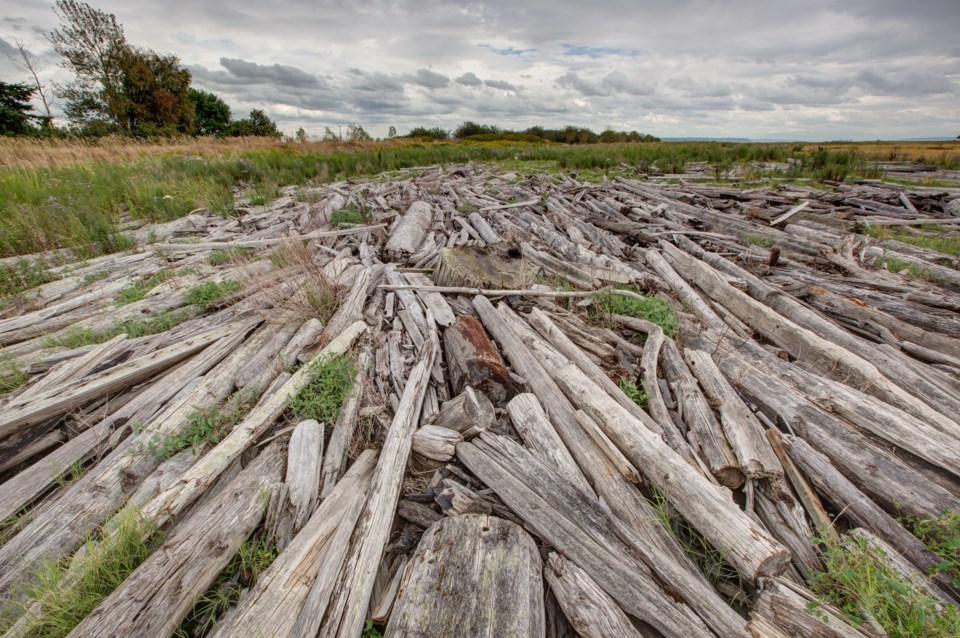The proposed Terminal 2 is still early in the application stage but that hasn't stopped Port Metro Vancouver from proceeding with environmental compensation for the project.
The port authority is undertaking a series of habitat compensation measures in Delta in collaboration with the Department of Fisheries and Oceans in what it calls its "habitat banking" program.
Habitat banking has been around in Canada for over 20 years, however until recently the majority of compensation projects were completed after developments occur. That was the case when a third berth was added at the Deltaport container terminal.
The port authority is now planning to complete compensation projects for the proposed Terminal 2 in order to obtain "habitat bank credits" in advance of constructing a second three-berth container facility at Roberts Bank.
Port Metro Vancouver says it's a proactive measure, intended to provide a balance between the overall health of the environment and any future development projects that may be required for port operations.
"Examples of habitat that could potentially be affected by port development could include eel grass beds, salt water marshes or intertidal marshes. As part of the Habitat Banking Program, these types of habitat are improved or created in another location, ahead of a project, to offset a future loss," the port explains.
The port notes the habitant bank involves identifying potential sites so that new habitat is constructed, enhanced or restored over time.
"Upon the completion of construction, and once the habitat is confirmed as stable and viable, it is considered as a 'deposit' in Port Metro Vancouver's habitat bank. This is just like you would make a money deposit into a
savings account at a bank. You are gathering credit, for use down the road as needed. For Port Metro Vancouver, the down the road use is port development proposals that may affect nearby habitat."
The Delta projects include restoration of salt marsh at five sites in Boundary Bay and Roberts Bank, as well as a project involving protecting Musqueam artifacts at the Glenrose tidal marsh, enlarging and protecting an existing marsh area at Westham Island and Canoe Pass, and identifying habitat enhancement opportunities at Gunderson Slough.
None of the projects involve any municipally-owned land.
A recent staff report to Delta council notes that of these projects, the Boundary Bay log removal plan will likely generate the most public interest because the dike in the area is popular with walkers, cyclists and birders.
It's recognized the area is where the snowy owls are often found, so the log removal work is required to cease on Sept. 30 in order to avoid potential conflicts with birds, the report notes.
The report also notes Delta needs to preserve its own compensation sites for future dike upgrade works it will seek.
Against Port Expansion's Roger Emsley told the Optimist he's opposed to the PMV project at Boundary Bay because the selected sites do not need so-called improving.
He said since logging practices changed years ago the marsh does not get a lot of debris. He also noted the small quantities of wood debris, in fact, increase the value of the salt marsh in that they provide refuge for small mammals.
The logs also provide perching areas for the birds that visit the area and the mammals become a food source for raptors and others in the winter, he said.
"This whole compensation program is yet another intrusion into our community by PMV. How dare they come into our community and carry out projects that have not gone to public hearing so that they can justify T2, which is by no means a done deal," Emsley said.
In a letter of protest to the port, Emsley stated, "PMV's justification for this habitat 'improvement' is so that they can later use it to offset the habitat destruction on Roberts Bank from their T2 project."
Delta South MLA Vicki Huntington echoed those concerns.
"The power of this federal agency is staggering, it is so sure of the environmental review process that it can actually move to 'compensate' for habitat loss and destruction years before it even gets project approval. It is yet another indication of just how much environmental reviews have been compromised," she said.
Huntington said she has asked her staff to look into the impact of the clean up on migrating snowy owls.



